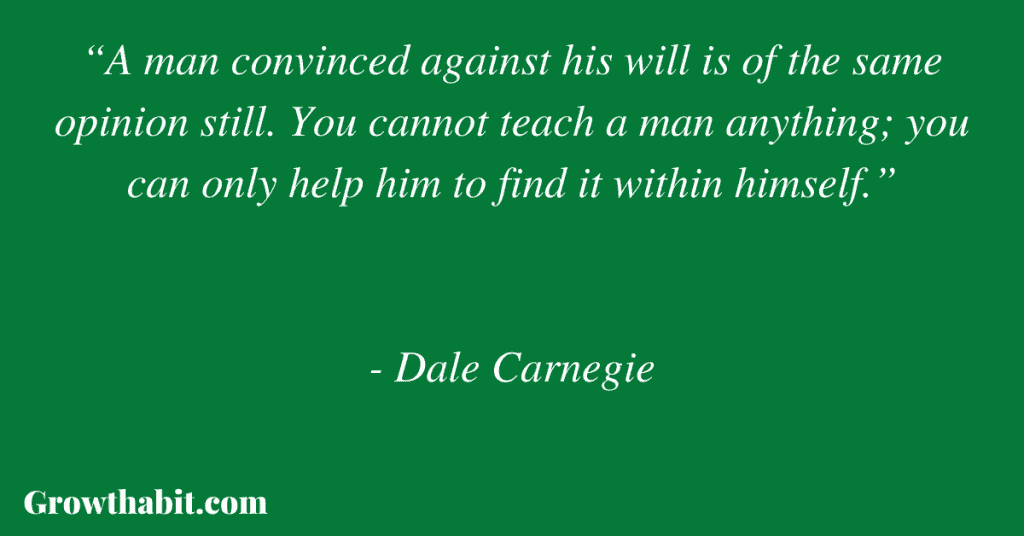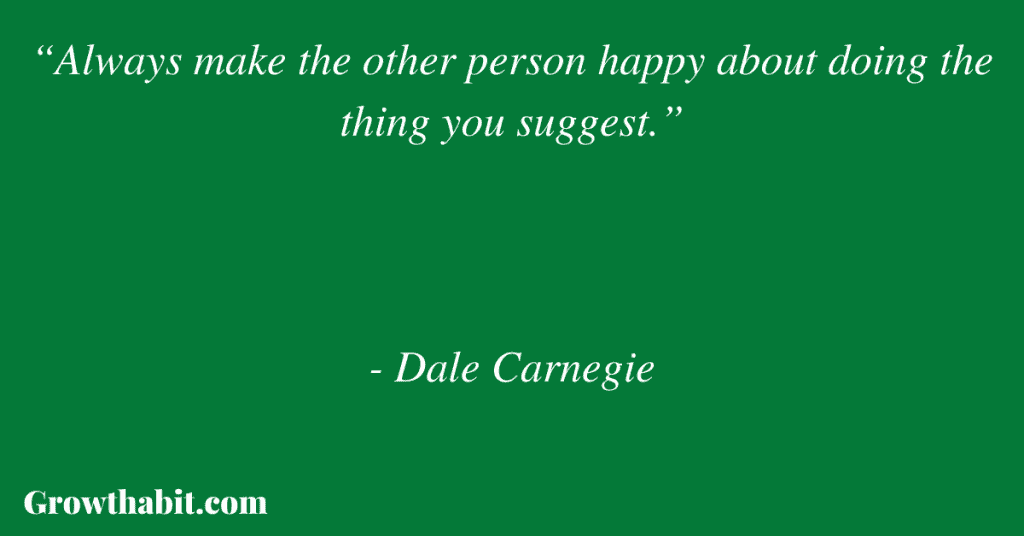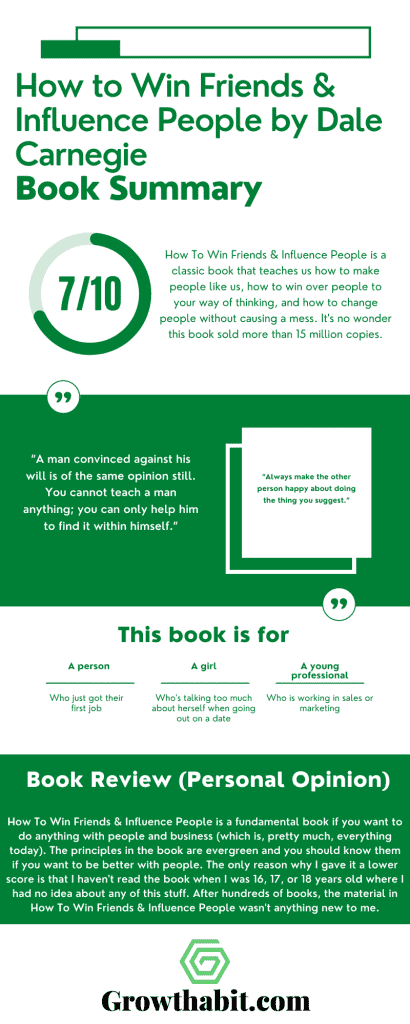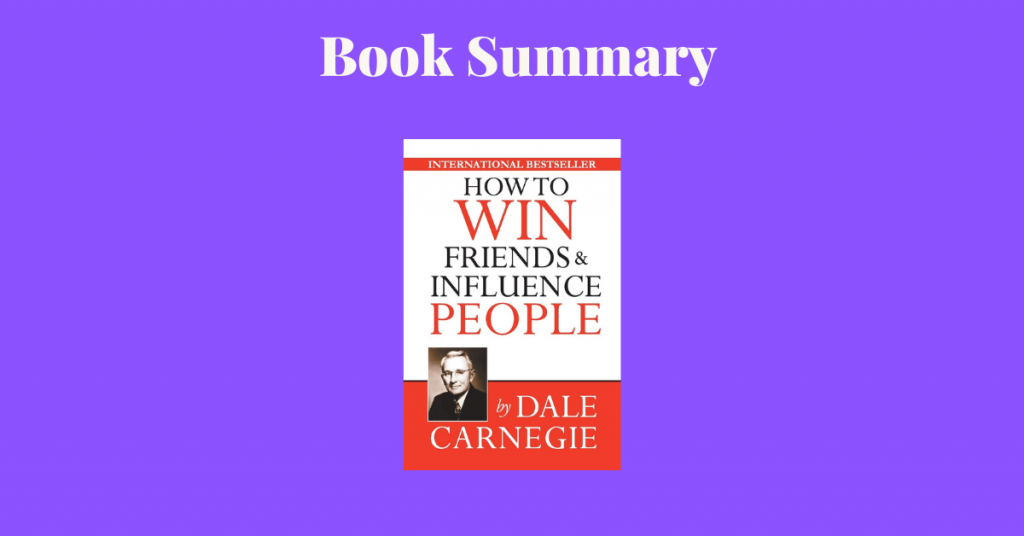How To Win Friends & Influence People is a classic book that teaches us how to make people like us, how to win over people to your way of thinking, and how to change people without causing a mess. It’s no wonder this book sold more than 15 million copies.
Book Title: How to Win Friends & Influence People
Author: Dale Carnegie
Date of Reading: June 2018
Rating: 7/10
What Is Being Said In Detail:
How To Win Friends & Influence People has four major parts and a total of 30 chapters. Each part teaches us one way to handle people and each chapter has a corresponding principle attached to it.
Part One
Part One is about learning the fundamental techniques in handling people.
- ‘If You Want to Gather Honey, Don’t Kick Over the Beehive.’ The corresponding principle is not to criticize, condemn, or complain.
- The Big Secret of Dealing with People. The corresponding principle is to give honest and sincere appreciation.
- ‘He Who Can Do This Has the Whole World with Him. He Who Cannot Walks a Lonely Way.’ The corresponding principle is to arouse in the other person an eager want.
Part Two
Part Two is about learning the six ways you can make people like you.
- Do This and You’ll Be Welcome Anywhere. The principle behind this chapter is to become genuinely interested in other people.
- A Simple Way to Make a Good First Impression. The principle behind this chapter is to smile at people.
- If You Don’t Do This, You Are Headed for Trouble. The principle behind this chapter is to remember that every person’s sweetest and most important sound in any language is their own name.
- An Easy Way to Become a Good Conversationalist. The principle behind this chapter is to be a good listener. And to encourage other people to talk about themselves.
- How to Interest People. The principle behind this chapter is to talk with the other person about their interests. Exactly what Shackleton did when they got stranded on Antarctica.
- How to Make People Like You Instantly. The principle behind this chapter is to make the other person feel important and to do it sincerely.
Part Three
Part Three covers the 12 ways you can use to win people to your way of thinking.
- You Can’t Win an Argument. The principle here is that the only way to get the best out of an argument is to avoid it completely.
- A Sure Way of Making Enemies – and How to Avoid It. The principle here is to show respect for other person’s opinions. Never say, “You’re wrong.”
- If You’re Wrong, Admit It. The principle here is that if you’re wrong, you should apologize quickly and emphatically.
- A Drop of Honey. The principle here is to begin in a friendly way.
- The Secret of Socrates. The principle here is to get the other person to say “yes, yes” as soon as possible.
- The Safety Valve in Handling Complaints. The principle here is to let the other person do most of the talking.
- How to Get Cooperation. The principle here is to get the other person to think that the idea is his.
- A Formula That Will Work Wonders for You. The principle here is to try honestly to see things from the other person’s perspective and point-of-view.
- What Everybody Wants. The principle here is to be sympathetic with the other person’s ideas and desires.
- An Appeal That Everybody Likes. The principle here is to appeal to nobler motives.
- The Movies Do It. TV Does It. Why Don’t You Do It? The principle here is to dramatize your ideas.
- When Nothing Else Works, Try This. The principle here is to throw down a challenge.
Part Four
Part Four is about becoming a leader. This part teaches us how to change people without causing resentment or offending people.
- If You Must Find Fault, This Is the Way to Begin. The principle behind the chapter is to begin with an honest praise and appreciation.
- How to Criticise – and Not Be Hated for It. The principle behind the chapter is to call attention to people’s mistakes indirectly.
- Talk About Your Own Mistakes First. The principle behind the chapter is to talk about your own mistakes before criticizing the other person.
- No One Likes to Take Orders. The principle behind the chapter is to ask questions instead of giving direct orders.
- Let the Other Person Save Face. The principle behind the chapter is to let the other person save face.
- How to Spur People On to Success. The principle behind the chapter is to praise even the slightest improvement.
- Give a Dog a Good Name. The principle behind the chapter is to give the other person a fine reputation to live up to.
- Make the Fault Seem Easy to Correct. The principle behind the chapter is to encourage people by ensuring them that the faults are easy to correct.
- Making People Glad to Do What You Want. The principle behind the chapter is to make the other person happy about doing the things you suggested.
Most Important Keywords, Sentences, Quotes:
Introduction
“These investigations revealed that even in such technical lines as engineering, about 15 percent of one’s financial success is due to one’s technical knowledge and about 85 percent is due to skill in human engineering – to personality and the ability to lead people.”
Part One: Fundamental Techniques In Handling People
“Hans Selye, another great psychologist, said, ‘As much as we thirst for approval, we dread condemnation.’”
“One of his favourite quotations was ‘Judge not, that ye be not judged.’ And when Mrs Lincoln and others spoke harshly of the southern people, Lincoln replied: ‘Don’t criticise them; they are just what we would be under similar circumstances.’”
“‘Don’t complain about the snow on your neighbour’s roof,’ said Confucious, ‘when your own doorstep is unclean.’”
“Any fool can criticise, condemn and complain – and most fools do. But it takes character and self-control to be understanding and forgiving. ‘A great man shows his greatness,’ said Carlyle, ‘by the way he treats little men.’”
“If you tell me how you get your feeling of importance, I’ll tell you what you are. That determines your character.”
“‘I consider my ability to arouse enthusiasm among my people,’ said Schwab, ‘the greatest asset I possess, and the way to develop the best that is in a person is by appreciation and encouragement.”
“As the old couplet says: ‘Once I did bad and that I heard ever/Twice I did good, but that I heard never.’”

“I once succumbed to the fad of fasting and went for six days and nights without eating. It wasn’t difficult. I was less hungry at the end of the sixth day than I was at the end of the second. Yet I know, as you know, people who would think they had committed a crime if they let their families or employees go for six days without food; but they will let them go for six days, and six weeks, and sometimes sixty years without giving them the hearty appreciation that they crave almost as much as they crave food.”
“General Obregon’s philosophy: ‘Don’t be afraid of enemies who attack you. Be afraid of the friends who flatter you.’”
“Why talk about what we want? That is childish. Absurd. Of course, you are interested in what you want. You are eternally interested in it. But no one else is. The rest of us are just like you: we are interested in what we want.”
“Tomorrow you may want to persuade somebody to do something. Before you speak, pause and ask yourself: ‘How can I make this person want to do it?’”
Part Two: Six Ways To Make People Like You
“You can make more friends in two months by becoming interested in other people than you can in two years by trying to get other people interested in you.”
“‘Action seems to follow feeling, but really action and feeling go together; and by regulating the action, which is under the more direct control of the will, we can indirectly regulate the feeling, which is not.”
“It isn’t what you have or who you are or where you are or what you are doing that makes you happy or unhappy. It is what you think about it.”
“The executive who tells me he can’t remember names is at the same time telling me he can’t remember a significant part of his business and is operating on quicksand.”
“Franklin D. Roosevelt knew that one of the simplest, most obvious and most important ways of gaining good will was by remembering names and making people feel important – yet how many of us do it?”
“From the waitress to the senior executive, the name will work magic as we deal with others.”
“But I had done this: I had listened intently.”
“But I had done this: I had listened intently. I had listened because I was genuinely interested. And he felt it. Naturally that pleased him.”
“A person’s toothache means more to that person than a famine in China which kills a million people.”
“So let’s obey the Golden Rule, and give unto others what we would have others give unto us. How? When? Where? The answer is: All the time, everywhere.”
“Mr. Eastman, I’ve been admiring your office. I wouldn’t mind working in a room like this myself. I’m in the interior woodworking business, and I never saw a more beautiful office in all my life.’”
“‘Talk to people about themselves and they will listen for hours.’”
Part Three: How To Win People To Your Way Of Thinking
“A man convinced against his will Is of the same opinion still. You cannot teach a man anything; you can only help him to find it within himself.”
“Any fool can try to defend his or her mistakes – and most fools do – but it raises one above the herd and gives one a feeling of nobility and exultation to admit one’s mistakes.”
“Scolding parents and domineering bosses and husbands and nagging wives ought to realize that people don’t want to change their minds. They can’t be forced or driven to agree with you or me. But they may possibly be led to, if we are gentle and friendly, ever so gentle and ever so friendly.”
“He told our class: ‘It was apparent that talking to, reasoning with or shouting at the service manager was not going to lead to a satisfactory resolution of my problems.”
“The sun can make you take off your coat more quickly than the wind; and kindliness, people, don’t begin by discussing the things on which you differ. Begin by TALKING WITH emphasising – and keep on emphasising – the things on which you agree. Keep emphasising, if possible, that you are both striving for the same end and that your only difference is one of method and not of purpose.”
“I began to realise that she needed me – not as a bossy mother, but as a confidante, an outlet for all her confusion about growing up. And all I had been doing was talking when I should have been listening. I never heard her.”
“La Rochefoucauld, the French philosopher, said: ‘If you want enemies, excel your friends; but if you want friends, let your friends excel you.’”
“Letting the other person feel that the idea is his or hers not only works in business and politics, it works in family life as well.”
“Ralph Waldo Emerson in his essay ‘Self-Reliance’ stated: ‘In every work of genius we recognise our own rejected thoughts; they come back to us with a certain alienated majesty.’”
“‘The reason why rivers and seas receive the homage of a hundred mountain streams is that they keep below them. Thus they are able to reign over all the mountain streams. So the sage, wishing to be above men, putteth himself below them; wishing to be before them, he putteth himself behind them. Thus, though his place be above men, they do not feel his weight; though his place be before them, they do not count it an injury.’”
“I would ride up to the boys, warn them that they could be jailed for starting a fire, order with a tone of authority that it be put out; and, if they refused, I would threaten to have them arrested. I was merely unloading my feelings without thinking of their point of view. The result? They obeyed – obeyed sullenly and with resentment. After I rode on over the hill, they probably rebuilt the fire and longed to burn up the whole park.”
“We won’t have any trees here at all if we aren’t more careful. You could be put in jail for building this fire. But I don’t want to be bossy and interfere with your pleasure. I like to see you enjoy yourselves; but won’t you please rake all the leaves away from the fire right now – and you’ll be careful to cover it with dirt, a lot of dirt, before you leave, won’t you?”

“If, as a result of reading this book, you get only one thing – an increased tendency to think always in terms of the other person’s point of view, and see things from that person’s angle, as well as your own – if you get only one thing from this book, it may easily prove to be one of the stepping stones of your career.”
“‘I don’t blame you one iota for feeling as you do. If I were you I would undoubtedly feel just as you do.’”
“J. Pierpont Morgan observed, in one of his analytical interludes, that a person usually has two reasons for doing a thing: one that sounds good and a real one.”
“This is the day of dramatisation. Merely stating a truth isn’t enough. The truth has to be made vivid, interesting, dramatic. You have to use showmanship. The movies do it. Television does it. And you will have to do it if you want attention.”
“was having difficulty getting his five-year-old boy and three-year-old daughter to pick up their toys, so he invented a ‘train.’ Joey was the engineer (Captain Casey Jones) on his tricycle. Janet’s wagon was attached, and in the evening she loaded all the ‘coal’ on the caboose (her wagon) and then jumped in while her brother drove her around the room. In this way the room was cleaned up – without lectures, arguments or threats.”
“‘All men have fears, but the brave put down their fears and go forward, sometimes to death, but always to victory’ was the motto of the King’s Guard in ancient Greece.”
“That is what every successful person loves: the game. The chance for self-expression. The chance to prove his or her worth, to excel, to win. That is what makes foot-races, and hog-calling, and pie-eating contests. The desire to excel. The desire for a feeling of importance.”
Part Four: Be A Leader: How To Change People Without Giving Offence Or Arousing Resentment
“After lunch, the subcontractor said, ‘Now, to get down to business. Naturally, I know why you’re here. I didn’t expect that our meeting would be so enjoyable. You can go back to Philadelphia with my promise that your material will be fabricated and shipped, even if other orders have to be delayed.’”
“The legendary French aviation pioneer and author Antoine de Saint-Exupéry wrote: ‘I have no right to say or do anything that diminishes a man in his own eyes. What matters is not what I think of him, but what he thinks of himself. Hurting a man in his dignity is a crime.’”
“True, he wasn’t paid a shilling for it, but one editor had praised him. One editor had given him recognition. He was so thrilled that he wandered aimlessly around the streets with tears rolling down his cheeks. The praise, the recognition, that he received through getting one story in print, changed his whole life, for if it hadn’t been for that encouragement, he might have spent his entire life working in rat infested factories. You may have heard of that boy. His name was Charles Dickens.”
“That praise changed the future of that boy and made a lasting impression on the history of English literature. For that boy went on to write innumerable best-selling books and made over a million dollars with his pen. You’ve probably heard of him. His name: H.G. Wells.”
“‘The average person,’ said Samuel Vauclain, then president of the Baldwin Locomotive Works, ‘can be led readily if you have his or her respect and if you show that you respect that person for some kind of ability.’”
“Always make the other person happy about doing the thing you suggest.”
“Childish? Perhaps. But that is what they said to Napoleon when he created the Legion of Honour and distributed 15,000 crosses to his soldiers and made eighteen of his generals ‘Marshals of France’ and called his troops the ‘Grand Army.’ Napoleon was criticised for giving ‘toys’ to war-hardened veterans, and Napoleon replied, ‘Men are ruled by toys.’”
A Shortcut To Distinction
“Dale Carnegie claimed that all people can talk when they get mad. He said that if you hit the most ignorant man in town on the jaw and knock him down, he would get on his feet and talk with an eloquence, heat and emphasis that would have rivalled that world famous orator William Jennings Bryan at the height of his career.”
“Dale Carnegie would tell you that he made a living all these years, not by teaching public speaking – that was incidental. His main job was to help people conquer their fears and develop courage.”
Book Review (Personal Opinion):
How To Win Friends & Influence People is a fundamental book if you want to do anything with people and business (which is, pretty much, everything today). The principles in the book are evergreen and you should know them if you want to be better with people. The only reason why I gave it a lower score is that I haven’t read the book when I was 16, 17, or 18 years old where I had no idea about any of this stuff. After hundreds of books, the material in How To Win Friends & Influence People wasn’t anything new to me.
Rating: 7/10
This Book Is For (Recommend):
- A person who just got their first job
- A girl who’s talking too much about herself when going out on a date
- A young professional who is working in sales or marketing
If You Want To Learn More
Here’s an interesting lecture on How To Win Friends & Influence People
Prof. Darren Lipomi
How I’ve Implemented The Ideas From The Book
I’ve used the principles this book describes to build two businesses, find the perfect girl, and have my university pay for my travels across Europe. Most of the things in this book are pure gold.
One Small Actionable Step You Can Do
I think that the world today lacks is more of the Socratic method. Next time you want to refute a person, ask them questions about their positions and ideas and let them refute themselves.

